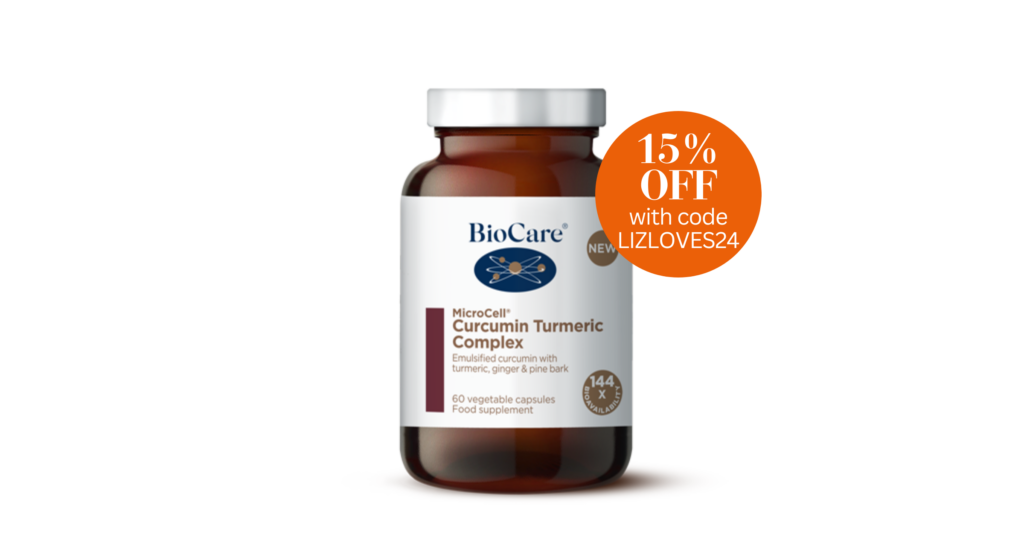Healthy Ingredients
The health benefits of turmeric
A staple in any spice cupboard, turmeric has been used in traditional Ayurvedic, Chinese and Japanese medicine for thousands of years.
This is thanks to curcumin, the active ingredient that gives turmeric its bright yellow colour as well as its potent anti-inflammatory benefits.
Read on to discover the science-backed health benefits associated with turmeric as well as ways to incorporate the time-tested spice into our daily routine.
The benefits of turmeric
Research suggests high-dose turmeric supplementation may be helpful for the treatment of a variety of conditions from anxiety and depression to arthritis.
In one small study, participants with osteoarthritis took 200 mg of curcumin each day in a supplement that also contained a soy-based ingredient to aid absorption. After three months, the participants’ self-reported symptoms had improved by an average of 58%, and they could walk four times farther on a treadmill.
In another study, healthy adults aged 60-85 saw significant improvements in both their short-term memory and attention just one hour after taking a 400mg curcumin supplement.
There’s also evidence to suggest curcumin may offer benefits for our hearts. In patients recovering from heart surgery, one small study found a 56% reduction in the risk of heart attack reoccurrence. Another study suggests that curcumin may help to improve the health of cells that line the walls of arteries.
It’s important to note, however, that many of the studies mentioned above were conducted on small groups of people. Larger studies are needed to more fully understand who stands to benefit from curcumin supplementation and which formulas are most effective.
Turmeric and inflammation
The majority of health benefits associated with turmeric and curcumin stem from their anti-inflammatory properties.
Though inflammation can cause harm to the body, we need this natural process to defend against disease. “Acute inflammation is a natural, protective and healing mechanism used by our immune system to respond at times of threat,” says Marta Anhelush, Head of Clinical Nutrition at BioCare.
We get into trouble, however, if high levels of inflammation persist for too long. “Chronic inflammation is very damaging and common in our modern society due to the cumulative effects of genetic and environmental factors,” Marta explains.
Lifestyle factors that can contribute to chronic inflammation include eating a diet rich in refined carbohydrates and ultra-processed foods, as well as poor sleep and a lack of exercise.
Research shows that prolonged inflammation increases our risk of heart disease, stroke and type-2 diabetes, as well as accelerated ageing (known as ‘inflammageing’) and inflammatory symptoms.
And while most of us could benefit from reducing our inflammatory load*, Marta says curcumin supplementation may be especially helpful for those with joint pain, gut inflammation and allergies, as well as respiratory or cardiovascular issues.
How to take turmeric
The cheapest and easiest way to get more turmeric into our bodies is via our diet. We have plenty of recipes on the website to help you get started – from our turmeric health shot to Liz’s golden glow smoothie. We even have a turmeric-infused mince pie recipe!
But, while adding turmeric to our daily meals is great for our health (boosting the gut-friendly diversity of our diet), we’re unlikely to get significant amounts of anti-inflammatory curcumin this way. Research shows that ground turmeric contains just 3% curcumin, for example.
For this reason, we may wish to boost our intake with a high-dose curcumin supplement.
“Curcumin has poor bioavailability meaning that the body doesn’t absorb it efficiently,” Marta adds. “Many supplements are formulated in a way to improve the absorption of curcumin, for instance by adding piperine from black pepper or by using special technologies. They can therefore provide a more therapeutic and controlled dose of curcumin, enhancing its health-promoting properties.”
*Curcumin supplements have a blood thinning effect and may not be suitable for those taking antiplatelet or anticoagulant drugs. Always consult a health practitioner before starting supplementation.
Best buys
BioCare Microcell® Curcumin Turmeric Complex
This pro-ageing supplement contains a blend of curcumin, turmeric, ginger and pine bark to support inflammation and immune balance, as well as circulation, joint and lung function.
The technology in this supplement makes the curcumin 144 times more bioavailable at 500mg (2 capsules) than many other high-dose curcumin supplements. “It also offers 40% faster absorption than standard curcumin, increasing blood levels within half an hour,” Marta says.
The Naked Pharmacy Natruflex® Turmeric Supplement
This high-potency turmeric blend also features naturally-sourced marine magnesium (to further support nerve function), as well as piperine – a black pepper extract which enhances the absorption of curcumin.
Read more features like this
- Everything you need to know about ultra-processed foods
- How electrolytes support our health during midlife and beyond
Please note, on some occasions, we earn revenue if you click the links and buy the products, but we never allow this to bias our coverage and always honestly review. For more information please read our Affiliate Policy.







